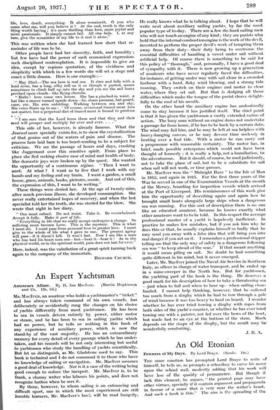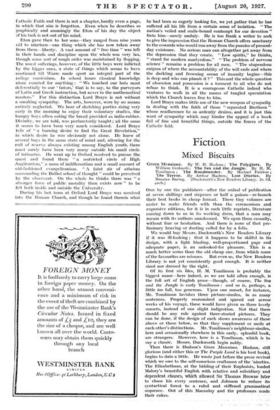An Old Etonian
Fewness of My Days. By Lord Braye. (Sands. 18s.)
THE same emotion has .prompted Lord Brayc to write of himself, he tells us, as prompts a schoolboy to carve his name upon the school wall, modestly adding that his work will have less of the quality of permanence. But though it lack this element, he argues, " the printed page may have other virtues, specially if it contain argument and propaganda in favour of a cause that . is very near the writer's heart. And such a book is this." The aim is the spreading of the
Catholic Faith and there is not a chapter, hardly even a page, in which that aim is forgotten. Even when he describes so graphically and amusingly the Eton of his day the object Of his task is not out of his mind.
Eton gave then to her sons—they ranged from nine years old to nineteen—one thing which she has now taken away from them—liberty. A vast amount of " free time " was left in their hands and discipline upon the whole was very lax, though some sort of rough order was maintained by flogging. The worst sufferings, however, of the little boys were inflicted by the bigger ones, a state of things which seems to have continued till Wane made sport an integral part of the college curriculum. In school hours classical knowledge alone counted for anything : " We touched our hats most deferentially to our ' tutors,' that is to say, to the purveyors of Latin and Greek instruction, but never to the mathematical masters." For this distinction Lord Braye is not without a sneaking sympathy. The arts, however, were by no means entirely neglected. We hear of sketching parties rising very early in the morning to enjoy their voluntary studies, the hungry boys often eating the bread provided as india-rubber. Divinity, we are told, was perfunctorily taught ; all the same it seems to have been very much considered. Lord Braye tells of " a burning desire to find the Great Revelation," in which desire he was obviously not alone. He knew of several boys in the same state of mind and, allowing for the cult of reserve always existing among English youth, there must surely have been very many outside his small circle of intimates. He went up to Oxford resolved to pursue the quest and found there " a restricted circle of High Anglicanism," a mass of indifferentism and a small amount of old-fashioned evangelicanism. " A faint air of atheism surrounding the Balliol school of thought " could be perceived by the observant. On the whole he thinks there was " a stronger force of public morality than exists now " to be felt both inside and outside the University.
During his last term at Oxford Lord Braye was received into the Roman Church, and though he found therein what he had been so eagerly looking for, we yet gather-that he has suffered all his life from a certain sense of isolation. " The nation's veiled and smile-bound contempt for our devotion " frets him—surely unduly. He is too frank a writer to seek to give the impression that the Roman Church offers sanctuary to the cowards who would run away from the puzzles of present- day existence. No serious man can altogether get away from the depression that they create. " Low spirits," he thinks, " stand for modern martyrdom." " The problem of nervous science " remains a problem for all men. " The stupendous enigma of where the accountability of the will ends and where the darkling and frowning ocean of insanity begins—this is deep and who can plumb it ? " This and the whole question of obsession and possession is a torment to all who do not refuse to think. It is a courageous Catholic indeed who ventures to walk in all the mazes of tangled speculation which the Church leaves free to him.
Lord Braye makes little use of the new weapon of sympathy in dealing with the faith of those " separated Brethren " whose readherence he so ardently desires, and it is just this want of sympathy which may hinder the appeal of a book full of fine and beautiful things, outside the fences of the Catholic fold.



































 Previous page
Previous page